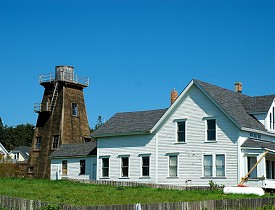Tips for Buying a House in a Rural Area
 Making a major relocation can come with a lot of unexpected things to think about, especially when it involves a big lifestyle change. I talked with Realtor DeeDee Thomas at Mendo Realty in Mendocino, California, about some of the common pitfalls her clients encounter when making the shift from urban to rural or semi-rural life. Whether you’re moving from the city or looking for a vacation home in a more rural area, it helps to be prepared when you start shopping.
Making a major relocation can come with a lot of unexpected things to think about, especially when it involves a big lifestyle change. I talked with Realtor DeeDee Thomas at Mendo Realty in Mendocino, California, about some of the common pitfalls her clients encounter when making the shift from urban to rural or semi-rural life. Whether you’re moving from the city or looking for a vacation home in a more rural area, it helps to be prepared when you start shopping.
Tip #1: Use a Local Agent
Her number one tip is to use a local agent, because someone who knows the area will be the most helpful. “If you have a friend who wants to help,” she says, “ask for a referral.” Friends working in real estate brokerages in the city don’t know the specifics of the area, but they may know agents who can help.
She also recommends shopping around to find a buyer’s agent, rather than going with the first one you find. When talking to real estate agents, she recommends getting their impressions of the area, asking them to discuss the current market situation, and finding out if they’ll offer contact information for prior clients. People who have worked with the agent before may have insights based on their experience that can help you decide which agent is best for your needs.
Tip #2: Research Local Amenities Like Hospitals and Schools
Once you have an agent, she says it’s important to talk about specific needs and expectations, including not just your budget and the general characteristics of the house you’re looking for, but things like school districts and access to health care. Parents may want to research local school districts and specify which one they’d like to access, while people who know they’ll need health services should definitely research area hospitals and medical care before making the decision to relocate.
A common problem she sees along the Mendocino Coast, for example, is that many people relocating from the Bay Area have services through Kaiser, which has an extensive network of facilities several hours south of her service area. These patients would have to travel for medical services, and they may not be aware of this fact unless they do their homework.
Tip #3: Learn About Local Zoning
Zoning, a common problem in urban areas as well, can take on new facets in rural communities. DeeDee warns that people should find out about the zoning of any properties they’re interested in, and should specifically learn about what is and isn’t allowed. Want to keep livestock? Find out about any limitations on animals. Interested in building a second unit or adding a story to a house? There may be restrictions on that, and you should know about them before you buy.
This goes double for homes in subdivisions and planned developments, as well as those located in historic districts and coastal zones. Rules in these areas can be very arcane, and may limit your abilities to develop a property in the way you want to. Don’t be afraid to grill your real estate agent about the limitations on a property, DeeDee says, because you “may have a whole new level of scrutiny” to face before you can hire a remodeling contractor and get started.
Tip #4: Inquire About Water Supply and Septic Issues
Another surprise for people planning to relocate can be water and septic issues. In urban areas, such services are provided and managed by their parent companies. In rural areas, you may be depending on a well and septic tank, or small community sewage plant, for your water and waste processing needs. When inspecting homes, it’s important to ask not just about the quality of the water, but also the quantity, as not all wells produce at the same level, and buyers should also inquire about the age and condition of the septic tank if a home is not connected to a sewer system.
Water and septic can be limitations to development; when looking at land for building your dream home, consider looking at property that’s already been evaluated and has existing well and septic permits, even if the facilities haven’t been installed. This can cut through red tape, in addition to allowing you to build more quickly once you close the deal.
Tip #5: Use a Real Estate Agent You Trust
Above all, says DeeDee, find a real estate agent you trust and enjoy working with, because your agent can help you find the property that’s right for you, and make sure you understand all the potential challenges you may face along the path to real estate ownership. Whether you’re a first time home-buyer or someone who’s familiar with the process, an agent familiar with the area and on your side will steer you away from bad investments, and point you towards the best options on the market.
s.e. smith writes about Bay Area plumbing and remodeling issues for Networx.
Looking for a Pro? Call us (866) 441-6648

Plumbing Average Costs
Plumbers Experiences

Local Handyman Fixes Fence Damaged By Jacksonville Summer Storm

Ceiling Fan Replacement By A Fast, Knowledgeable And Reasonable Electrician



